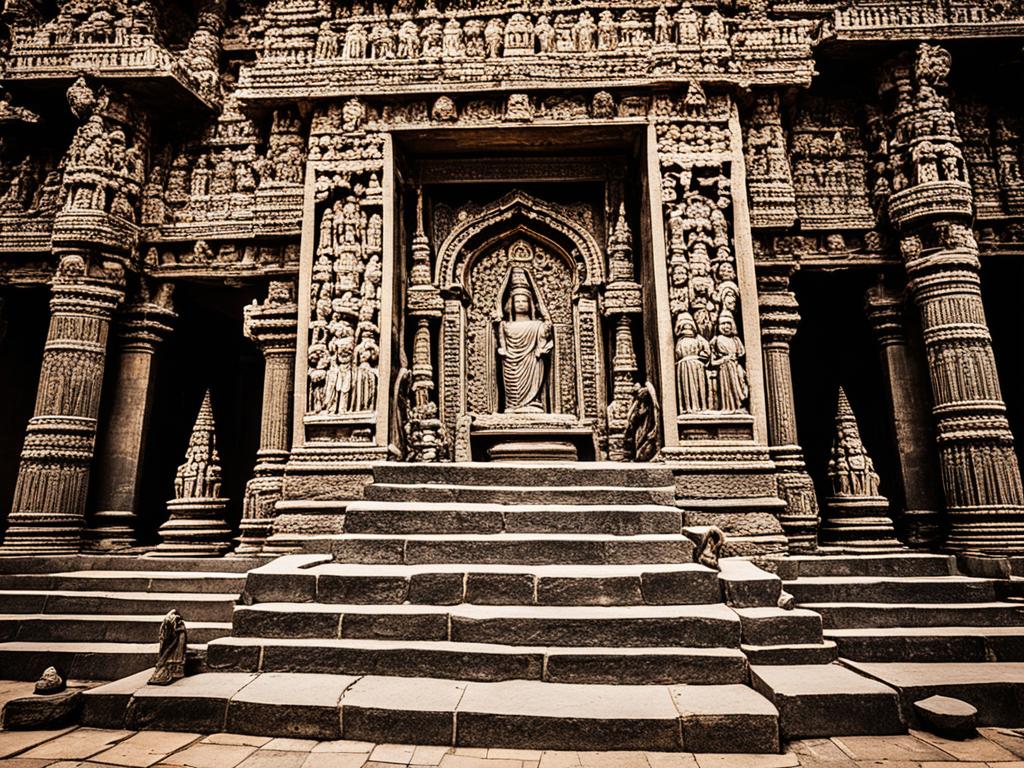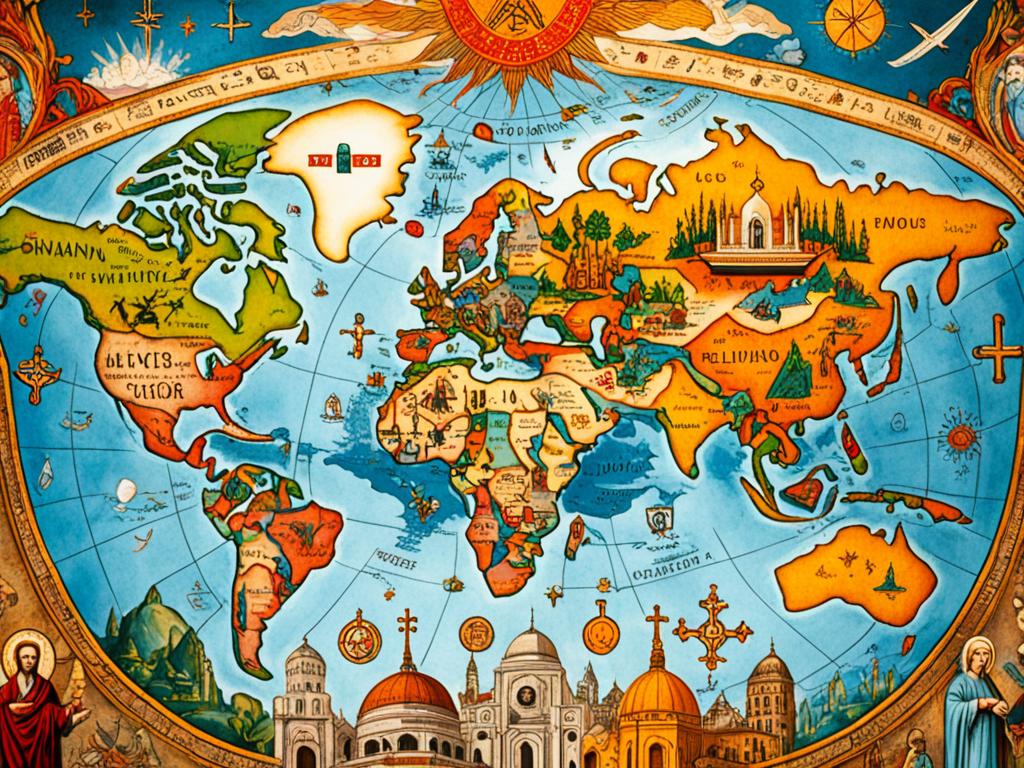For centuries, religion has been key in human civilization, shaping cultures, values, and societies. Major religions like Christianity, Islam, Hinduism, Buddhism, and Folk religion have about 6.4 billion followers, out of 7.9 billion people. Around 385 million follow other non-major religions worldwide. These believers form and impact cultural traditions, societal norms, and spiritual practices.
Religion means a system of religious beliefs, practices, and values focused on higher powers. It includes faiths like Christianity, Islam, Hinduism, Buddhism, and many indigenous religions. Religion guides people, communities, and civilizations, influencing their cultural expressions, value systems, and social dynamics.
Key Takeaways
- Religion has profoundly influenced the development of cultures and civilizations throughout history.
- Religious beliefs and practices shape various aspects of society, including art, literature, governance, and moral frameworks.
- Religion plays a significant role in establishing cultural identity and contributing to diversity within a country.
- The interplay between religion and culture is complex, with both shaping and influencing each other over time.
- Understanding the historical impact of religion on culture is essential for promoting interfaith dialogue and cross-cultural exchange.
Defining Religion and Culture
Religion and culture can mean different things to each person. Emile Durkheim described religion as a set of sacred beliefs and practices. These bring a moral community together. Paul Tillich saw religion as feeling the grasp of something important above all else. He said this ultimate concern provides life’s true meaning.
Sociological and Theological Perspectives on Religion
Experts in sociology and theology look at many parts of culture when defining it. These include customs, languages, and values. They also look at how people relate to one another. Both groups aim to understand culture, studying human beliefs and customs deeply.
Understanding Culture: Elements and Hierarchy
This understanding also includes how people and groups connect in society. Exploring these relationships is key to understanding culture. Knowing about a culture’s religion is also important.
The Interplay Between Religion and Culture
The term “religion” comes from the Latin word religio. The ancient Romans used it to talk about their rituals and beliefs. Christianity spread through the Roman Empire, affecting the way we see religions today. In today’s world, we see that religion and culture shape each other deeply. Each religion has its unique aspects, and each culture shows religion in its own way.
Cultural Practices Shaped by Religion
Religion really changes how we do things in our culture. This can be seen in art, music, language, and food. It also affects the clothes we wear, our celebrations, grief, and how we talk to others. For example, in Hinduism, people wear special clothes, like sarees and dhotis, for their ceremonies and festivals.
Rituals and Traditions Rooted in Religious Teachings
Religious rituals and traditions make us feel like we belong and connect us. They mark big moments in life and show our faith. Things like baptism in Christianity, or the five pillars of Islam are good examples. Then there are special events tied to marriage, birth, and death in many faiths. Religious festivals are a key part of keeping culture alive and connecting people. They create a feeling of togetherness and remind us of our shared beliefs. Festivals, such as Diwali, Christmas, and Eid are very important in this way.

Religion and Values: Moral Frameworks
Religion teaches people about what’s right and wrong, helping them live good lives. For instance, in Judaism and Christianity, there are the Ten Commandments. These talk about being honest, respecting others, and valuing life. So, religion guides our choices by being our moral compass.
Ethical Guidelines and Principles from Religious Teachings
Religious teachings touch on big social issues like poverty and inequality. Many religions push for fairness and helping those who are struggling. Islam, for example, has “Zakat,” which is about sharing wealth with the less fortunate.
The Role of Religion in Shaping Personal Values
Religion affects how we see family, love, and fairness. It can make us more caring and understanding towards everyone. Religion inspires qualities like forgiveness and kindness.
| Statistic | Value |
|---|---|
| Number of religions globally | Over 10,000 |
| Percentage of U.S. population speaking a language other than English at home | 18% |
| Estimated number of people worldwide identifying as atheists, agnostics, or secular | 1.2 billion |
| Percentage of Americans who believe morality is impossible without belief in God | Over 50% |
The Influence of Religion on Culture Throughout History
Studying history means looking at the history of religions too. Some religions see studying history as wrong. But, for others, it’s very important. When we talk about religion, we can’t leave out its history.
Religion has acted both as a tool for freedom and one for control. It shapes personal identity and governs people. It’s also influenced by political power. Religions have always played a big role in human history. Today, they are still major players in shaping knowledge, the arts, and technology.
The historical impact of religion on culture, religion’s role in shaping civilizations, and religion’s influence on cultural development are huge. Religions have been key in how human societies have grown. They’ve given us beliefs, morals, and how we live together.

Since ancient times, religion has driven the cultural development of many places like Mesopotamia and Egypt. It guided the Abrahamic religions and the spread of Buddhism and Hinduism. Religion has always been at the core of world civilizations. Seeing how religion and culture mix is key to understanding human history.
Social Structures and Religion
Religion has a big part in how societies are put together. It gives a backbone for how people interact and stick together. It can change how families, groups and even whole cultures are set up. In some places, the ones in charge of religion have a lot of power. They protect the rules of the faith and help steer people in the right direction.
Religion’s Impact on Social Organization
Places like churches, mosques, and temples are more than just for prayers. They’re spots where folks come together to learn, bond, and help out. They offer teachings and emotional support, making the community stronger. Sometimes in these groups, there are clear ranks that show who is in charge, mirroring the community itself.
Religious Institutions and Their Societal Roles
Leaders in religions, like priests and imams, can have a big effect in their areas. The rank they hold can change how power, social standing, and chances to thrive are shared out.
Religious Hierarchies and Social Hierarchies
The link between who’s in charge of religion and who’s important in society is not simple. Sometimes, religious leaders support the way things are. Other times, they push against it, trying to make changes in how people are seen and treated.
Case Studies: Religion’s Impact Across Cultures
Religion deeply influences cultures worldwide. A look into major world religions shows how faith molds values, traditions, and societies. This study provides insights into religion’s role in shaping our diverse world.
Christianity and Western Societies
Christianity has greatly shaped Western life. It has influenced art, literature, and moral beliefs. The faith played a key role in Europe’s history, affecting laws and social norms. Over time, Christianity helped Western civilizations thrive, spurring on art, knowledge, and solidifying shared values.
Islam and Middle Eastern Cultures
Islam is a fundamental part of the Middle East’s culture. Its values are seen in everything from art to family life. Islamic teachings unite the region, guiding how people live each day. They have influenced the area’s identity and social setup greatly.
Hinduism and Indian Society
Hinduism deeply impacts India’s way of life. It influences the caste system, family structures, and cultural practices. This religion offers a broad view on life, covering spiritual growth and ethical living. Hinduism has shaped Indian culture in a significant way.
Buddhism and East Asian Cultures
Buddhism has had a big effect on East Asia. It has influenced their art, thinking, and customs. Through teachings like compassion, Buddhism has given rise to unique cultural traits. China, Japan, and Korea reflect this through their daily practices and worldviews, celebrating their distinct heritage.

Controversies and Challenges
Religion can bring people together, but it has also caused conflicts due to religious differences. These differences in beliefs lead to problems like discrimination and violence. It’s important to understand and respect all religious views to create peace.
Conflicts Arising from Religious Differences
Since the 1960s, American religion has become more diverse. Politico-religious landscapes now include a mix of ethnic communities. This setup celebrates differences but can also cause tensions due to unique cultural and religious practices.
Secularism and the Religion-State Relationship
Secularism aims to separate religion and government. This can be complicated in diverse societies. Finding a balance between freedom and governance is hard. The growing number of Spanish speakers in California adds complexity to this issue.
Gender Roles and Equality in Religious Contexts
Religions often set specific gender roles, but this is changing. Today, there are debates about gender roles and equality within religious communities. Multiculturalism and the push for inclusion have helped these discussions. Women are now advocating for equal status and rights in religious leadership.
Religious Diversity and Cross-Cultural Exchange
Religion has a big impact on how cultures, values, and societies work. It guides people’s actions, teaches right from wrong, and helps organize life in communities. Knowing how religion affects society helps people talk across faiths, value diversity, and work for peace.
Religious diversity and cross-cultural exchange help different faiths get along. Talking openly and understanding the beauty in various religious beliefs can make societies more fair and welcoming. This is crucial given that big religions have about 6.4 billion followers worldwide, but 385 million people follow less common faiths.
Welcoming religious pluralism teaches us to respect and enjoy the many ways of life. It helps us understand and work with each other better. This way, we can create a global society that’s peaceful, celebrates differences, and honors each culture and religion’s unique gifts.
Source Links
- https://study.com/academy/lesson/how-religion-contributes-to-cultural-change.html
- https://www.multifaitheducation.com.au/2023/06/25/how-religion-shapes-cultures-values-and-social-structures-in-different-societies/
- https://cldv100.commons.gc.cuny.edu/wp-content/blogs.dir/16021/files/2018/10/Amoah-Final-Paper.pdf
- https://uen.pressbooks.pub/speakingofculture/chapter/chapter-9-religion-and-culture/
- https://www.rgj.com/story/life/2021/12/21/does-religion-shape-culture-does-culture-shape-religion-faith-forum/8981074002/
- https://stratfordjournals.org/journals/index.php/Journal-of-Sociology-Psychology/article/download/1467/1904/4660
- https://www.ncbi.nlm.nih.gov/pmc/articles/PMC4345965/
- https://nationalhumanitiescenter.org/tserve/twenty/tkeyinfo/trelww2.htm
- https://www.heritage.org/civil-society/report/why-religion-matters-the-impact-religious-practice-social-stability
- https://www.ncbi.nlm.nih.gov/pmc/articles/PMC9282533/


